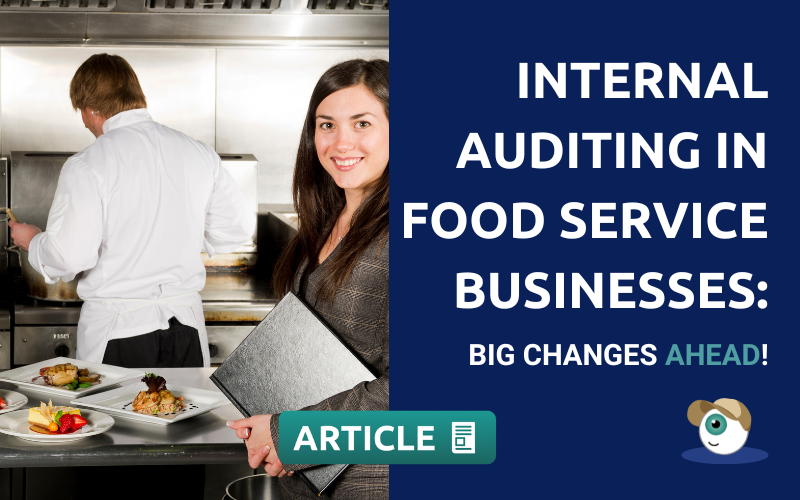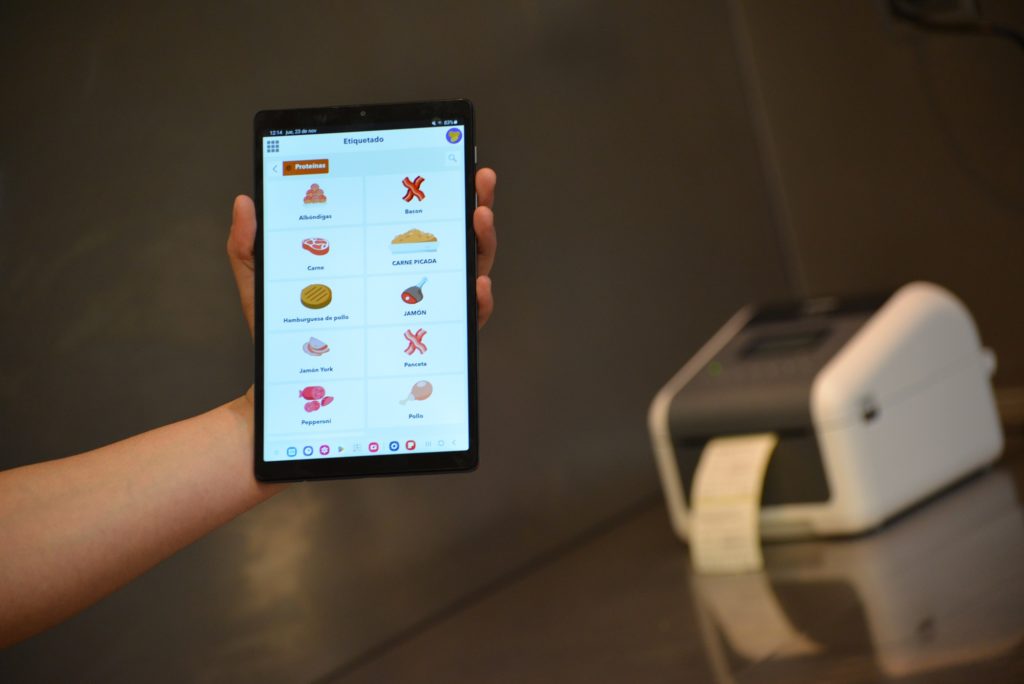Internal auditing in food service businesses: big changes ahead!

The Food Standards Agency (FSA) is making waves with its proposal to allow major grocery retailers to self-assess their food hygiene ratings.
This move, designed to free up resources for smaller businesses, has sparked a debate about the effectiveness of internal auditing in food service businesses – including supermarkets- and the role of technology in food safety management.
In this article, we’ll explore the key aspects of this proposal and explore the broader implications for the food service industry. We’ll discuss the importance of internal auditing for food service businesses, the benefits of automation, and how Andy App is revolutionising food safety practices.
Proposed internal auditing in food service businesses
The Food Standards Agency (FSA) is proposing a significant change to the way food hygiene ratings are assigned in the UK.
Under the current system, local authority food safety officers conduct inspections and award ratings to food businesses.
However, the FSA is now considering allowing large grocery retailers to submit their own third-party audit data to determine their ratings.
This move is driven by a desire to free up limited enforcement capacity for smaller food businesses, which are often considered to be at higher risk of non-compliance. By relying on retailer-submitted internal auditing in food service businesses, the FSA hopes to focus its resources on businesses that pose a greater threat to public health.
The proposal is based on trials conducted with leading grocery retailers, which demonstrated that it is possible to make a reliable assessment of a business’ food hygiene systems and processes using their own audit data.
While local authorities would still have the ability to conduct inspections of large retailers, these would be less frequent if the retailer’s self-assessments are validated.
The FSA believes that this new approach could lead to improved food hygiene standards across the board, as it would encourage retailers to maintain high standards to avoid negative publicity and potential enforcement action.
Additionally, it could save time and resources for both retailers and local authorities.
However, there are also concerns about the potential for conflicts of interest and the risk of retailers manipulating their own audit data.
The FSA will need to carefully consider these issues and implement safeguards to ensure the integrity of the system.
Key Points:
- The FSA plans to allow large retailers like Tesco and Sainsbury’s to submit their own audit data.
- This would reduce the workload of local authority food safety officers.
- The focus will shift to higher-risk businesses, such as smaller takeaways and online food sellers.
- The FSA is conducting trials to validate the effectiveness of retailer-submitted audits.
Global Trends in Internal Auditing in Food service businesses
While the UK is pioneering the use of self-assessment for food hygiene ratings, other countries are also exploring innovative approaches to improve food safety regulation.
United States
The Food Safety Modernization Act (FSMA) introduced new requirements for food businesses to implement preventive controls and conduct periodic internal audits. The FDA has also developed guidance documents and training materials to assist businesses in complying with these requirements.
European Union
The General Food Law (GFL) of the EU requires food businesses to implement a food safety management system (FSMS). This includes conducting regular internal audits to verify compliance with the GFL and other relevant regulations.
The EU has also published guidance documents on internal auditing for food businesses.
Australia and New Zealand
In Australia and New Zealand, the Australian New Zealand Food Standards Code requires food businesses to implement a food safety program, which includes internal auditing. The Food Standards Australia New Zealand (FSANZ) has developed guidance materials on internal auditing for food businesses.
Canada
The Canadian Food Inspection Agency (CFIA) requires food businesses to implement a food safety plan, which includes internal audits. The CFIA has also published guidance documents on internal auditing and provides training and support to food businesses.
China
The State Administration for Market Regulation (SAMR) has issued regulations on food safety management systems, which require businesses to conduct internal audits. The SAMR has also published guidance documents on internal auditing and provides training and support to food businesses.
The Importance of Internal Auditing in Food Service Businesses
Internal auditing is a critical component of any effective food safety management system.
It involves the independent assessment of an organisation’s processes, controls, and systems to ensure compliance with regulations and identify areas for improvement.
Benefits of internal auditing in food service businesses:
- Risk identification: Helps identify potential risks and vulnerabilities before they become serious issues.
- Compliance assurance: Ensures compliance with food safety regulations and industry standards.
- Continuous improvement: Provides insights for process improvement and optimisation.
- Costs reduction: It can help identify areas where resources can be optimised and costs reduced.
- Enhanced reputation: Demonstrates commitment to food safety and quality.
Automating internal auditing in food service businesses
Internal auditing is a critical component of any effective food safety management system.
However, conducting regular, high-quality audits and ensuring proper follow-up and data analysis can be time-consuming and resource-intensive. In today’s turbulent hospitality labour market, finding and retaining dedicated staff for these tasks can be challenging.
The Benefits of Automated Internal Auditing in Food Service Businesses
- Increased efficiency: Automation can streamline tasks, reduce manual errors, and save time for food safety teams.
- Improved accuracy: Automated systems can help ensure consistency and accuracy in data collection and analysis.
- Enhanced data insights: Automated tools can provide valuable insights into food safety performance and identify areas for improvement.
- Costs reduction: Automation can help reduce the overall cost of food safety management by streamlining processes and minimising errors.
- Improved compliance: Automated systems can help ensure compliance with food safety regulations and industry standards.
- Enhanced traceability: Automated data collection and analysis can improve traceability throughout the food supply chain.
- More informed decision-making: Automated systems can provide valuable data to support informed decision-making.
- Scalability: Automated systems can easily scale to accommodate growth and changes in business operations.
Key self-assessment tasks that can be automated:
- Sheduling audits: Automatically schedule audits based on predefined frequency and risk assessment criteria.
- Creating checklists and templates: Generate customised checklists and templates for different types of audits.
- Collecting and analysing data: Automatically collect data from various sources and analyse it to identify trends and patterns.
- Generating reports: Automatically generate detailed reports on audit findings, corrective actions, and overall food safety performance.
- Tracking corrective actions: Monitor the progress of corrective actions and ensure timely completion.
Choosing the right internal auditing automation tool
What factors should you take into account when selecting an automated internal auditing solution?
- Customisation: The tool should be customisable to fit your specific needs and processes.
- Integration: The tool should integrate seamlessly with your existing food safety management systems.
- Ease of use: The tool should be user-friendly and intuitive for your team to use.
- Scalability: The self-auditing tool should be able to grow with your business and accommodate changes in your operations.
By automating internal auditing, food businesses can improve efficiency, accuracy, and compliance, while also freeing up valuable resources to focus on other critical tasks.
Automate your Internal Auditing Tasks with Digital Assistant Andy App
Many leading food service businesses, including large supermarket chains and international food service companies, have already recognised the value of automated internal auditing with Andy App. These businesses have successfully used Andy to streamline their processes, improve compliance, and reduce costs.

How does Andy App support and benefit the automation of your food safety and operational excellence tasks in your food service business?
- Customisable checklists: Create tailored checklists to address your specific food safety needs and regulatory requirements.
- Automated scheduling: Schedule audits and inspections automatically, ensuring timely compliance.
- Data collection and analysis: Collect and analyse data from audits and inspections to identify trends and areas for improvement.
- Real-time reporting: Generate comprehensive reports on audit findings, corrective actions, and overall food safety performance.
- Mobile accessibility: Access and manage your audits from anywhere with the Andy App mobile app.
- Enhanced traceability: Track food products throughout your supply chain to identify potential issues.
- Reduced risk of non-compliance: Ensure compliance with food safety regulations and industry standards.
- Improved decision-making: Use data-driven insights to make informed decisions about your food safety program.
You can check some of Andy’s success stories here.
The trend towards self-assessment of food hygiene ratings is gaining momentum, as evidenced by the FSA’s proposal and the growing number of food businesses adopting automated internal auditing tools.
Stay ahead of the curve with Andy and ensure your food safety program is robust, efficient, and compliant.
📢Don’t forget: prevention is always better than reaction!


